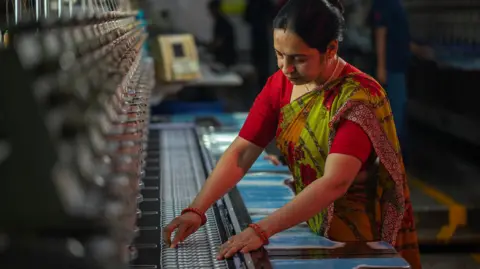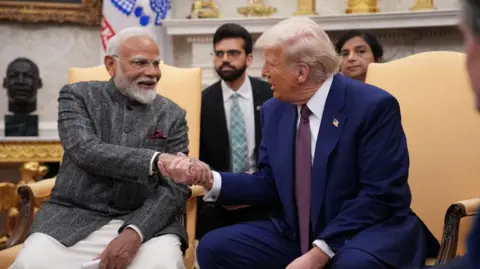How will India navigate a world on the brink of a trade war?
 Getty Images
Getty ImagesDonald Trump's blanket tariffs have put the world on the brink of a possible global trade war. The European Union has vowed a united response, and China has threatened countermeasures.
Ratings agencies like Fitch have warned that the mass tariff hikes could result in lower growth, higher inflation and potentially a recession in some parts of the world.
How will India - Asia's third largest economy - navigate these global tremors?
Trump has dealt the most brutal blow to Asian countries, slapping 34% tariffs on China in addition to the 20% previously levied. Vietnam and Cambodia will have to pay 46% and 49% respectively.
In relative terms, at 27% India has fared better.
But the rate is still steep and will severely affect major "labour intensive exports", says Priyanka Kishore of the consultancy Asia Decoded. "That will likely have a knock-on impact on domestic demand and headline gross domestic product at a time when growth is already stuttering," said Ms Kishore.
But the new trade realities also throw up opportunities for India.
Its new tariff differential with Asian peers may potentially lead to some export re-routing. "We can bring the footwear and garments business from Asian peers if we get our act together," says Nilesh Shah, a veteran fund manager.
This will take time though.
Prime Minister Narendra Modi's government will thus have to be strategic in how it navigates the situation.
Foremost, the announcement should "give the government a greater sense of urgency in wrapping up a trade deal with the US", says Rahul Ahluwalia, a public policy expert who previously worked for a government department. "The US is our largest export market, so this is serious stuff."
India exports some $91bn (£69bn) in goods to the US, which account for 18% of its overall exports. Hectic trade negotiations have been under way with a fall deadline for conclusion. Ahluwalia says that deadline could now be compressed and brought forward.
While doing that, India must also expand export markets beyond the US and focus on regions where tariffs remain low, such as Europe, Southeast Asia, and Africa, recommends Indian trade research agency GTRI.
In the last couple of years, India has shown a renewed appetite for trade deals, launching free trade agreement (FTA) talks with a range of countries and blocs, including the European Union and the United Kingdom.
Last year, Delhi signed a $100bn free trade agreement with the European Free Trade Association (EFTA) - a group of four European countries that are not members of the European Union.
Experts say talks with other partners could now be expedited as cracks deepen between the US and many other global economies over Trump's actions.
But even as trade negotiations carry on with global partners, the government will need a plan on how it deals with the domestic fallout of Trump's decision.
Impact on sectors that employ millions of people - like gems and jewellery and textiles - is likely to be significant. The government will need to extend support through means like expanding production-linked subsidies to ensure that India's domestic industry stays globally competitive and can leverage the new opportunities this has thrown up, according to the consultancy, Ernst & Young
The tariffs are "fundamentally reshaping the global trading system", says Agneshwar Sen, a trade policy expert at Ernst & Young India. This will require a "fundamental revaluation of trading strategies" as new supply chains emerge, he adds.
India will also have to be mindful of other risk factors that emerge from this - such as "Chinese dumping", says Mr Shah.
As it becomes more difficult for Chinese goods to enter the US, these will have to find other markets. And there are few others that are as large as India.
"The global South accounts for more than 20% of global consumption and is where the new middle class is being created. This is where China will attempt to sell," according to Akash Prakash of Amansa Capital, an investment management company in Singapore.
 Getty Images
Getty ImagesFor the moment there's little clarity and no official word from the government on what its plans are.
India has already reduced tariffs on some goods including high-end motorbikes and bourbon whiskey. Unlike Canada, Mexico or the European Union, Modi's government has adopted a conciliatory approach to Trump and these announcements are unlikely to trigger a retaliation, say experts.
Indian businesses will now most likely face a period of uncertainty which is unlikely to go away anytime soon.
"Clearly, the (Trump) administration wants even broader and deeper tariff cuts. The question is what, if anything, will satisfy the Trump administration?", Milan Vaishnav, a senior fellow at Carnegie Endowment told the BBC.
It is a million dollar question, for which there are no immediate answers.
Follow BBC News India on Instagram, YouTube, X and Facebook.
